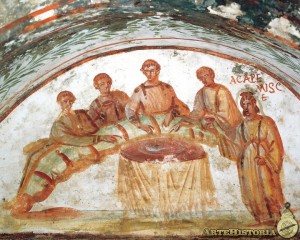27 February OS 2016 – Friday of Cheesefare Week; St. Procopius of Decapolis
The two Old Testament readings in the services today are from the Prophet Zacharias – at the Sixth Hour, chapter eight, verses seven to seventeen, at Vespers chapter eight, verses nineteen to 23. The Lord speaks to the prophet telling him to announce God’s mercy to those who repent. Not only will God forgive and bless His people, but other nations will come and turn to the Lord, as well.
Commenting on these passages, St. Theophan the Recluse has this to say:
“So will I save you, and ye shall be a blessing,” promises the Lord through the prophet Zachariah (Zach. 8:13). But under what condition? Under the condition that every man will speak the truth to his neighbor, that men will righteously sort out their affairs amongst themselves, that men will not remember wrongs in their hearts against their neighbor, that they will love no false oath, and will love truth and peace. If these conditions are met, says the Lord, “they shall be to me a people, and I will be to them a God, in truth and in righteousness (Zach 8:8),” and His blessing shall spread among them. Then all strangers shall hear and say, “Let us go speedily to them to pray before the Lord, for we have heard that the Lord is with them (cf. Zach. 8: 21-23). “And many peoples and many nations shall come to seek earnestly the face of the Lord Almighty (Zach. 8:22).”
Thus did the high moral purity of the first Christians attract people and nations to the Lord. Those who live always according to the spirit of Christ are, without the use of words, the best preachers of Christ and the most convincing apostles of Christianity. – Thoughts for Each Day of the Year, p. 52
“Thus did the high moral purity of the first Christians attract people and nations to the Lord.” God had prepared the pagan world of that time to accept the Gospel, and the pagan world was exhausted spiritually, looking for answers. They were ready for the new Faith. And when they not only heard the divinely inspired preaching of the Apostles and other holy teachers of the Faith, and beheld so many healings and other miracles, but also saw how differently the Christians lived from everyone else – the extreme purity and stability of their family lives, their generosity to the poor, their forgiveness and meekness in the face of persecution – they were overwhelmed: this, in deed, as well as in word, was the Truth.
Our situation is different today, in that we are not dealing with pre-Christians who are hungering and thirsting for the truth but with post-Christians who do not care about truth or who believe that it is true that there is no truth and cannot even see that such a position is senseless. We are dealing with people who already think they know who Christ is and what the Church is, and either overtly reject both, or embrace some distorted version of the Faith, or – which is most common – are indifferent, satisfied with a vague religious feeling and satisfied with themselves. To get people to admit there is One, True Faith, much less that Orthodoxy – something still unknown to the vast majority of Americans – is that Faith, is a tall order. Our task, however, remains the same, which is repentance, with constant re-commitment, daily renewed efforts to lead our lives according to the Orthodox Faith. Great Lent is the pre-eminent time to do this.
Because we live in this post-Christian age, however, we must be content to labor in isolation, not expecting great outward results. This is our cross, the particular struggle the Lord has assigned to us, in His wisdom and providence from all eternity. We will have the courage to go on with this struggle if we do two things: if we have an intense life of prayer and if we constantly strive to communicate with like-minded fellow Orthodox. The life of prayer, nourished by spiritual reading, will console us inwardly, and talking to spiritual friends will console us from without. Conversely, two great dangers that threaten us are giving up on developing a life of prayer and living only outwardly, and isolating ourselves from our priest, our parish, and from Orthodox friends.
As part of our plan for Lent, then, let us look honestly at our practice of daily prayer and spiritual reading, and re-dedicate ourselves to a daily discipline. Let us plan to go to confession as soon as possible, and also to re-connect with fellow parishioners or other Orthodox friends whose encouragement has helped us in the past. “A brother helped by a brother is a strong city.”

